Margaret Thatcher Obituary: Thatcherism Defined 20th-Century Politics and Protest
Iron Lady Margaret Hilda Roberts hailed as Britain's greatest peacetime prime minister of 20th century
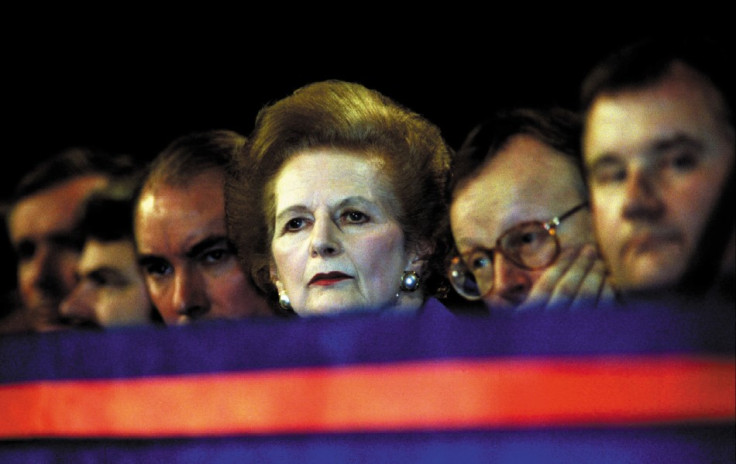
From chemist to milk snatcher, from Iron Lady to dementia patient, Margaret Thatcher led a remarkable life both personally and politically.
She was born Margaret Hilda Roberts in 1925 to a greengrocer from Lincolnshire. Fifty-four years later she became the first - and to this day only - female prime minister of Great Britain and would go on to become the country's longest-serving PM of the 20th century.
She has been as divisive in death as she was in life. While many have paid tribute to the former Conservative leader, others have displayed less sympathy and have refused to forgive her for her controversial and radical decisions in office.
Alfred Roberts, her father, had a huge influence on her political beliefs, and she credited him for encouraging her in her education, work ethic and sense of individualism.
In one of her most famous speeches, Thatcher declared that there was no such thing as society.
"We have gone through a period when too many children and people have been given to understand 'I have a problem, it is the government's job to cope with it', or 'I have a problem, I will go and get a grant to cope with it. I am homeless, the government must house me'," she said. "So they are casting their problems on society and who is society? There is no such thing."
"There are individual men and women and there are families and no government can do anything except through people, and people look to themselves first. It is our duty to look after ourselves and then also to help look after our neighbour. Life is a reciprocal business and people have got entitlements too much in mind without the obligations."

Thatcher went to Somerville College, Oxford, where she became one of the few women presidents of the university's Conservative Association.
She worked as a chemist after graduating but entered politics at the age of 24, when she was adopted as the prospective Conservative parliamentary candidate for Dartford, Kent.
Although she lost that year, she continued to fight for her seat, eventually winning Finchley in 1959, eight years after marrying Denis Thatcher and six after qualifying as a barrister and having twins, Carol and Mark.
After backing Ted Heath in the 1965 leadership elections, Thatcher was made education secretary in 1970 and was quickly nicknamed the "Milk Snatcher" after ending the provision of free milk for schoolchildren.
She dismissed the idea of a female prime minister in a TV interview, saying: "I don't think there will be a woman prime minister in my lifetime." Six years later, she was leader of the country.
Thatcher stood for leadership against Heath in 1975. He told her "you'll lose" but she won and became the first female leader of the Conservative party.
Just a year later, she was given the name thye Iron Lady by a Russian newspaper. To her pleasure, the name stuck.
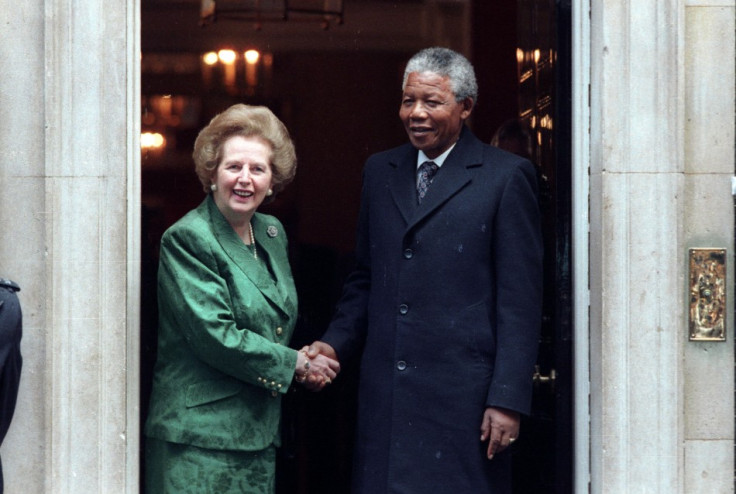
After she led the Tories to power in 1979, Thatcher introduced bills to cut union influence and allowed council house tenants to buy their own homes and shares in state-owned businesses. Her policies made the City of London one of the most successful financial powerhouses in the world.
But her plan to cut double-digit inflation by boosting the free market eventually backfired and unemployment soared to well over three million.
Refusing to back down she said: "To those waiting with bated breath for that favourite media catchphrase, the U-turn, I have only one thing to say. You turn if you want to. The lady is not for turning."
Against a tumultuous social backdrop, her popularity soon started to wane and by 1981 Thatcher was on the brink of failure. But a shift in the economy and her decisive response to the Argentine invasion of the Falklands gave her approval rating a huge boost.
Victory in the Falklands resulted in the Conservative party winning by a landslide in that year's election.
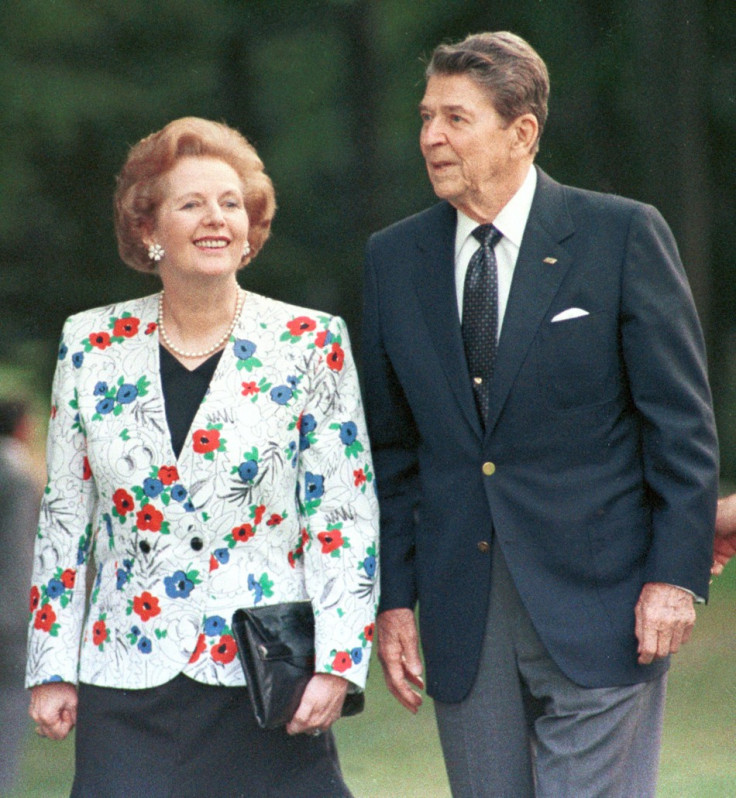
Thatcher's friendship with US presdient Ronald Regan also gained widespread attention, as did her relationship with Soviet president Mikhail Gorbachev, who she said she "could do business" with.
After winning the 1987 election, her popularity with the public and her own party began to drop. She replaced household rates with the Community Charge, which was quickly dubbed the "poll tax" and sparked violent street protests that contributed to her downfall.
As more tory MPs started to lose faith in their leader there was also speculation that Queen Elizabeth II had fallen out with her. The palace had to publicly deny the rumours and years later Thatcher said of the relationship: "I always found the Queen's attitude towards the work of the government absolutely correct#. Stories of clashes between 'two powerful women' were just too good not to make up."
In 1989, the seeds were sown for her downfall. After attacking other European leaders and refusing to allow the then European Community to have more power, senior politician Sir Geoffrey Howe, who had been removed from his role as foreign secretary, resigned.
In his resignation speech, he said: "The tragedy is - and it is for me personally, for my party, for our whole people, and for my Right Honourable Friend herself, a very real tragedy - that the prime minister's perceived attitude towards Europe is running increasingly serious risks for the future of our nation. It risks minimising our influence and maximising our chances of being once again shut out."
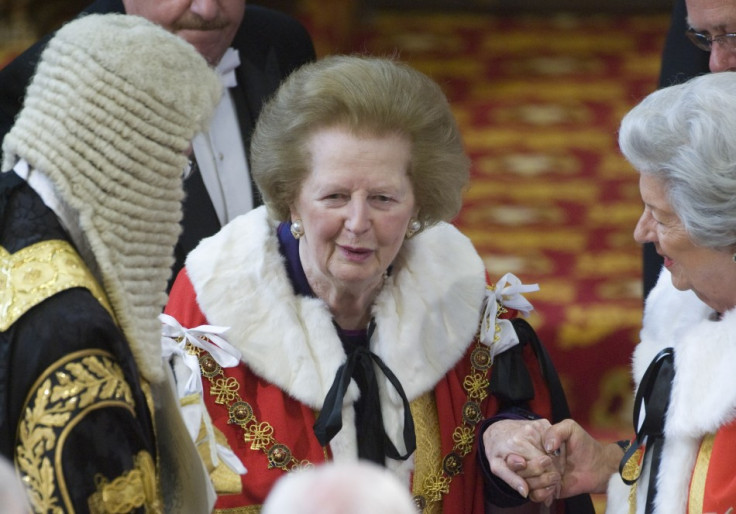
Other MPs also quit and analysts warned Thatcher that she would not win another leadership election. As the pressure mounted on her, even the Iron Lady began to buckle and she was eventually squeezed out of office.
In the years that followed, she was made baroness and wrote two volumes of memoirs. She continued to be politically active and endorsed William Hague for the leadership election in 1997.
Thatcher's health began to deteriorate in 2001 and she was forced to reign in public activities. A series of strokes left her increasingly frail and she was advised to curtail public speaking appearances altogether.
Her husband Denis died in 2003 and in an emotional tribute to him she said: "Being prime minister is a lonely job. In a sense, it ought to be - you cannot lead from a crowd. But with Denis there I was never alone. What a man. What a husband. What a friend."
She travelled to the US for the funeral of Regan in 2004 but from then on, her appearances became increasingly infrequent.
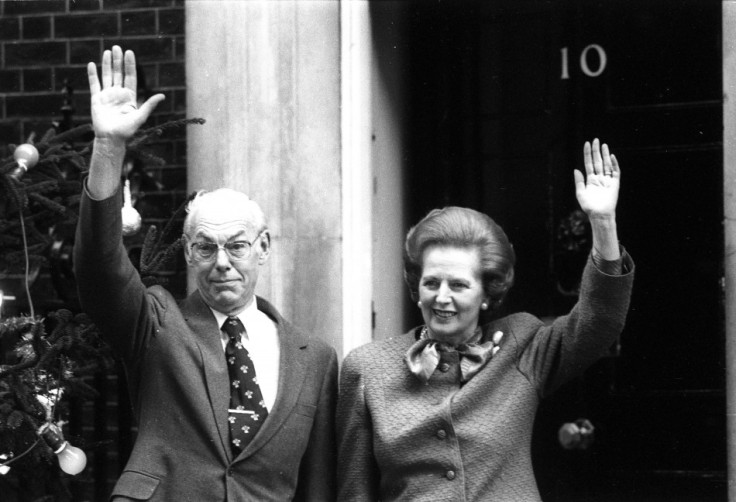
Four years later, she collapsed at a House of Lords dinner and was admitted to hospital. That same year, her daughter Carol made it known that her mother was suffering from dementia.
An invitation to Downing Street from David Cameron for her 85<sup>th birthday was turned down and she could not attend Prince William and Kate Middleton's 2011 wedding because of poor health.
Announcing her death, her publicist Lord Bell said: "It is with great sadness that Mark and Carol Thatcher announced that their mother Baroness Thatcher died peacefully following a stroke."
In his eulogy, David Cameron said: "As our first woman prime minister, Margaret Thatcher succeeded against all the odds.
"The real thing about Margaret Thatcher is that she didn't just lead our country, she saved our country, and she will go down as the greatest British peacetime prime minister."
© Copyright IBTimes 2024. All rights reserved.






